- Home
- Bruce, Leo
Death of a Commuter Page 19
Death of a Commuter Read online
Page 19
“I noticed, too, how conveniently invisible from anywhere, certainly from any window, was the yard at the back of the Old Manor where the cars of both Felix and Rumble must have stood that evening. It was an ideal place to keep them during the hours when no one must know that either of the men was in the house and the body could have been put in the car there. Even Rumble’s hysteria with me, when he found I had been questioning Elspeth, could be explained by his love and consideration for her which, I for one, never doubted. I had my theory but as Detective-Inspector Haggard is about to tell me, there was no proof worth a cold carrot.
“For a time it continued like that. Elspeth and Rumble decided that it would be best to let it be seen that they were in love. They thought, probably rightly, that more suspicion would be aroused by clandestine meetings, if they were discovered, than an open, even proud, admission. They also decided to return the will anonymously to Thriver. They were not much worried about me, but Henrietta Ballard was a different matter.
“Very indicative was Elspeth’s reaction to the brief-case. When she saw it in my hand at her house she never batted an eyelid. If she had known nothing of what had happened to Felix’s she would have remarked on it. Couldn’t have helped doing so. It could only be that old-fashioned thing a guilty conscience which made her affect to ignore it But this again was not proof.
“Then, in a place and at a time when I least expected it came what I needed. At Chatty Dogman’s party there appeared dramatically the woman Felix Parador had been keeping. She had heard from Thriver that according to the only will in his possession she had been left nothing and, drunk or drugged or both, she had come to raise hell with Elspeth as publicly as possible. Elspeth kept her head while she raged but when she had gone, as any woman might, she broke down. Her remarkable self-possession left her and she let fall those words which, if the death penalty had not been abolished, would have hanged her as surely as Edith Thompson’s love-letters hanged her. Henrietta had shouted, ‘he left me without a sou’, and Elspeth, in the hysteria of reaction after she had gone, said, ‘and he didn’t leave her without a sou’.
“Remember, this was before the will had been sent back to Thriver. It proved that Elspeth had seen the will. It proved that Felix had been to his house that night. It proved—to my mind at least—that Elspeth and her lover had murdered him.”
There was silence for a moment then Haggard said quietly, “There are other possible explanations, you know.”
“There are. But so remote that they needn’t be seriously considered. What I wanted was enough to persuade the police to reopen the case. Once they did so they would find the evidence which in their position of authority, and with their expertise they can find, while I cannot. Which you will find, I believe, when you have heard the rest.”
There was a long pause which even Mr. Gorringer did not interrupt.
“I was not yet satisfied and there was still George Catford. I deliberately told Elspeth that I had unearthed Catford and was going to see him. This put her and Rumble in a desperate position. If I was once able to make Catford talk they were both lost. They decided to risk everything on an attempt to kill me that night. I had told Elspeth that my housekeeper would be away and they hoped to find me alone in the house. There were risks here—that someone might note the number of their car or that they might be seen. They guarded against these as best they could. Rumble had his old overalls from the time he rode a motor-cycle (as I had heard from Thriver), and Elspeth, I would like to bet, still had the things she needed to put on an effective make-up. But whatever the risks, they had to take them. The alternative was failure and imprisonment—the sure, the only alternative. So they arrived here that evening and found the curtains of this room undrawn and the room lit only by firelight.
“I don’t know how much Rumble saw when he looked in but not enough to distinguish me and shoot me from there. He tried to enter by the front door but found himself blocked by a stranger. Quite desperate now, he levelled his revolver at the headmaster’s chest and forced him to retreat. But when I shot at the sky through that window he lost his nerve. Heaven knows what he thought, if he thought at all, but his first anxiety was for Elspeth waiting in the car outside. Perhaps he thought I had shot at her, though I could not even see the car from here. He dashed out and they drove away.
“As you know, I emptied the house after that. I expected that as soon as Rumble and Elspeth saw that no newspaper carried any account of the incident they would conclude, as was indeed the case, that if anyone heard the sound of a shot they had put it down to a car backfiring. They could now only hope that Catford would be greedy enough to keep the thing to himself in order to obtain the money they promised him, and telephoned him that very evening to tell him the money was being arranged and would be handed over in a day or two. Whether one or both of them came here again on the following night I don’t know. In their state of mind at that time they were capable of it.”
“You were taking serious risks, Deene,” said Mr. Gorringer reproachfully. “Of both your own life and … others.”
Carolus went on rather hurriedly.
“I was lucky enough to obtain a room in the boarding-house owned by Catford’s aunt in which he lived. I learned a great deal about that young man—excellent material for neo-nazi recruitment. My miscalculation was in respect of Rumble. I thought he would have the sense to hand over the money, however much it was. That was the only way in which I could account for those few days’ delay. If he had done so it would have meant that I could go at last to the police with a case of murder and one of blackmail neatly tied up. But Rumble and Elspeth had decided otherwise. They did not believe themselves suspected of anything, for I had maintained the friendliest relations with Elspeth. In that case there would be nothing in the world to connect either of them with the murder of Catford, and their dream of life together would come true.
“It was decided that Rumble should do this alone. He telephoned to the number Catford had given him, his aunt’s, and told Catford he was ready to hand over. Catford himself was wary enough to take no chances of hidden tape-recorders or witnesses and arranged the meeting at the Great Ring. He set off on his motor-cycle and I followed, but was unfortunately delayed by a car parked in front of mine. I smashed its window and got away as fast as possible but was too late. I arrived to see the vicar’s car, which Rumble had stolen for the purpose, coming out of the lane from the Great Ring. I found that Catford had been shot through the back of the head while he had been lifting his motor-cycle on its stand.
“Back in Brenstead I stopped only to confirm that it was the vicar’s car that had been used and learn from his wife that Hopelady had been in bed with flu since yesterday afternoon. That could, of course, be checked with the doctor …”
“It has been,” said Hemingway quietly.
“I then went to report the finding of Catford’s body to the police. My report was received with a certain scepticism, perhaps because the registration number of the motor-cycle was the one I had given when I was trying to trace Catford.”
“You could scarcely expect anything else, Mr. Deene.”
“I didn’t. But I had to make my report credible enough for a police car to go out at once.”
“Which it did, of course. You will probably be surprised to know that James Rumble has already been charged with the murder of George Catford.”
Mr. Gorringer could not keep silence.
“I am surprised, at all events! This will be the first time I have known one of Deene’s theories actually anticipated!”
“It has nothing to do with Mr. Deene’s theories. Police work is less complicated than that, and more practical, perhaps. We do not look for these elaborate theories based on instincts, intuitions and so on, but we do have our simple methods of procedure. James Rumble was seen returning the vicar’s car to its place by a very observant witness, Miss Nora Limpole, which set in motion other enquiries, finger-print tests and so on. Rumble has already made a statem
ent His chief object seems to be to take all the blame on himself. Not,” added Haggard patronisingly, “that yours has not been a very interesting story, Mr. Deene.”
“He can’t take all the blame himself,” said Carolus. “I was about to tell you that after I had reported to the police I went to the Old Manor. Rumble’s coat was hanging in the hall, but Elspeth said he was ‘staying in for an early night’. Clearly he had come to report and was somewhere in the house. I felt his presence and knew that if I gave any indication that I knew the truth I should have had it On the contrary, I said that I had abandoned the case and Catford had taken his secrets to the grave. I’ve never in my life felt nearer to an unpleasant death.”
“I hope you never are nearer, my dear Deene. But I’m bound to point out that such risks come of meddling in affairs which the police are perfectly capable of handling without your intervention.”
“Not at all. They knew that Rumble killed Catford, that’s all. They did not know why. They did not know that he and Elspeth also killed Felix Parador.”
“We don’t know that now, Mr. Deene. You have provided us with some very interesting possibilities. That is all There is no proof.”
“Oh, proof? said Carolus, almost contemptuously. “I leave that to you. You have all the facilities. Proof is a technical matter.”
“Which follows in the wake of inspiration; is that it, Mr. Deene?” said Hemingway, smiling grimly. “You may be right. But it would never do for us to start thinking like that What you have done here is to suggest a possible motive for the murder of Catford. It is not unlikely that we should have had that within twenty-four hours. We haven’t yet gone through Catford’s papers.”
The two detective-inspectors rose to leave. Carolus sank back exhausted in his chair.
“You think they will act on your excellent suggestions?” queried Mr. Gorringer.
“It’s not a matter of that. The whole thing follows automatically now. Elspeth and Rumble will both get life sentences of course.”
“For murder,” Mr. Gorringer reminded him.
“For a very cruel and pitiless murder and for a savage and ruthless one.”
“Then what is troubling you?”
“Not any injustice. The sentence will be most just. But something else. You know, when I met them, they both seemed such thoroughly nice people.”
“I catch your drift” said Mr. Gorringer nodding solemnly. “You mean that what we call nice people may not be nice at all. May, in fact, be …”
“Murderers,” said Carolus wearily and emptied his glass at a gulp.

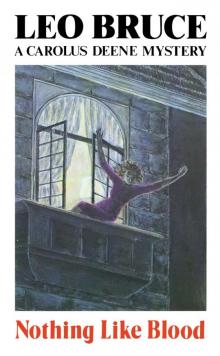 Nothing Like Blood
Nothing Like Blood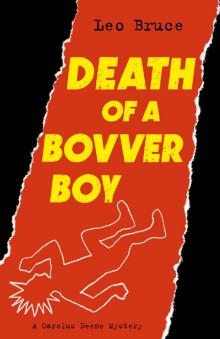 Death of a Bovver Boy
Death of a Bovver Boy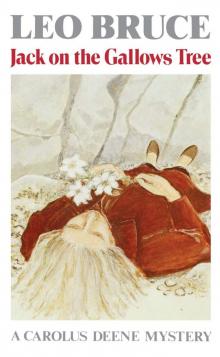 Jack on the Gallows Tree
Jack on the Gallows Tree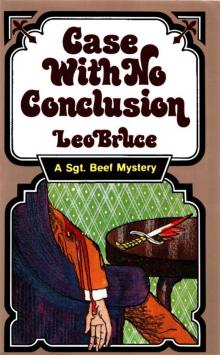 Case with No Conclusion
Case with No Conclusion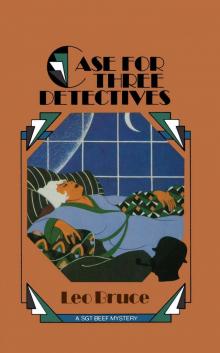 Case for Three Detectives
Case for Three Detectives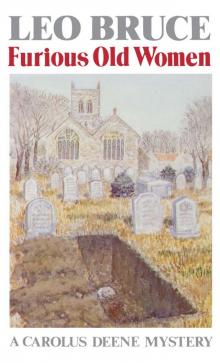 Furious Old Women
Furious Old Women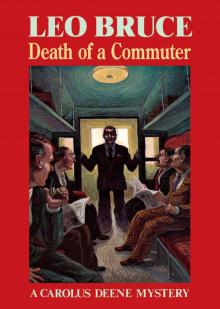 Death of a Commuter
Death of a Commuter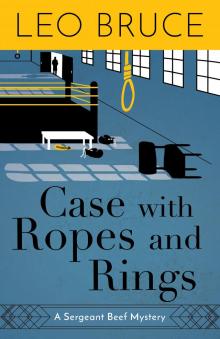 Case with Ropes and Rings
Case with Ropes and Rings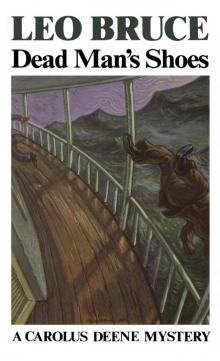 Dead Man’s Shoes
Dead Man’s Shoes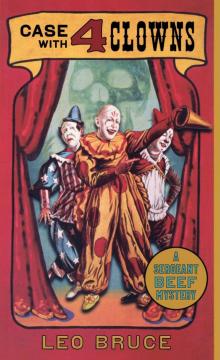 Case with 4 Clowns
Case with 4 Clowns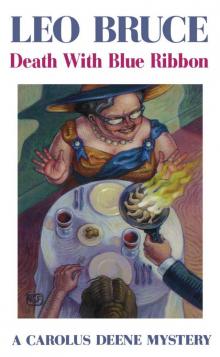 Death with Blue Ribbon
Death with Blue Ribbon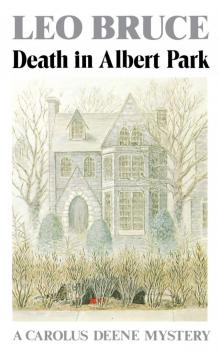 Death in Albert Park
Death in Albert Park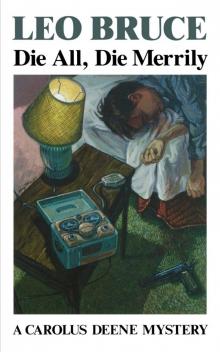 Die All, Die Merrily
Die All, Die Merrily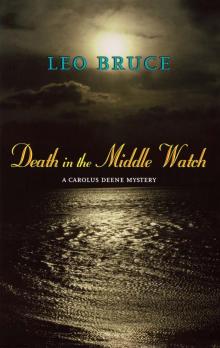 Death in the Middle Watch
Death in the Middle Watch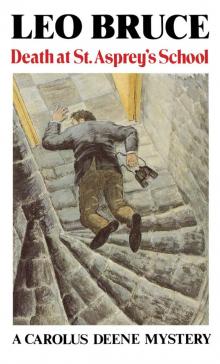 Death at St. Asprey’s School
Death at St. Asprey’s School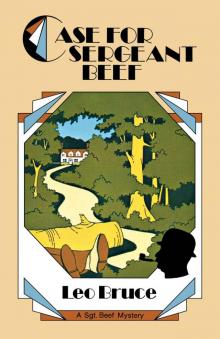 Case for Sergeant Beef
Case for Sergeant Beef